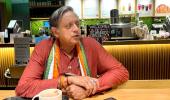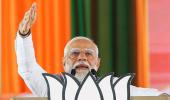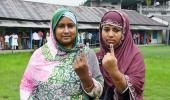'Elections are fought to win.'
'In our party, the leadership takes the final decision, and our leaders are very clear about it.'

Donning traditional dhoti-punjabi to counter Chief Minister Naveen Patnaik's lungi-clad video message, which the Bharatiya Janata Party claims is not Odia culture, Dharmendra Pradhan says this election is all about fighting for Odia Ashmita (pride).
In a conversation with Ramani Ranjan Mohapatra/Business Standard in Sambalpur, from where he is contesting, Pradhan -- the Union minister for education, skill development and entrepreneurship -- speaks about the National Democratic Alliance securing over 400 seats and unemployment issue.
What are the issues deciding the elections this time around?
There is a clear signal that the Modi government will secure a third consecutive term, this time with over 400 seats.
In Odisha, the prime minister's popularity is more than 90 per cent.
In 2019, the BJP won eight of the 21 seats in Odisha with a 38 per cent vote share, compared to the BJD's 43 per cent.
We are winning all 21 seats this time.
The Modi government has allocated Rs 18 trillion to Odisha between 2014 and 2024, against the Rs 3 trillion sanctioned by the Congress-led government in the previous decade.
A record 3.4 million houses have been built under the Pradhan Mantri Awas Yojna in Odisha.
Significant funds have been allocated for railways, airports, the Mahatma Gandhi National Rural Employment Guarantee Scheme, Covid management, and the free rice scheme.
For the assembly elections, we created our voter base in 2019. Despite ruling Odisha for 24 years with huge mandates, the Patnaik government has failed in five key areas -- health, education, agriculture, migration, and women's security.
According to the National Family Health Survey, Odisha leads in child malnutrition rates. The posts of doctors are vacant.
The poor would benefit a lot if the state's Biju Swasthya Kalyan Yojana (health insurance scheme) is merged with the Centre's Ayushman Bharat, which is done by many non-BJP-ruled states.
Unfortunately, the Odisha government resists this due to politics.
Simply building schools with tiles doesn't guarantee quality education. Teacher shortages and high dropout rates in matriculation are concerning.
Despite being an agrarian state with abundant water bodies, regions around the Mahanadi and Brahmani rivers face drought conditions. Drinking water scarcity is evident during summer months.
What has the Biju Janata Dal government done to address migration? Why do people migrate despite Odisha having rich resources? The state government lacks vision and relies on propaganda.
According to the latest National Crime Records Bureau report, Odisha ranks fourth in reported cases of women abuse.
The BJD government's failures in these key areas have led to growing resentment among voters, who have resolved to change in government here.
In Odisha, there is no value for democracy. An elected representative has no power. In a democracy, bureaucrats help the elected representative in discharging their duties.
It's the opposite in Odisha. Our fight will be against this undemocratic force.
Flareups in West Asia threaten crude oil prices. As a former oil minister, how do you think India should navigate?
It's a challenging situation, but I think energy diversion is key here. The Centre has rolled out the PM Suryaghar Yojna, which provides free electricity to the poor in India.
Energy management is a futuristic and long-term process. India has found alternative energy solutions and will go ahead with its plan.
What are your achievements as education minister? Has the debate over the National Education Policy (2020) settled?
There has been no debate. I think this is for the first time after Independence that we have a document that is based on such wide suggestions.
It has found acceptability among all states. The NEP shows a paradigm shift in education, and talks about self-reliance and self-employability.
You are also minister for skill development and entrepreneurship. Multiple surveys by agencies suggest unemployment is a key election issue this time? How do you respond?
The recent data shows a decline in the unemployment rate in India. This is a subject that needs regular intervention.
Innovation, technology, disruptions, and new economy are all associated with employment, and the Modi government has created a long-term road map.
India is one of the world's startup-centric countries. It is home to more than 120,000 startups.
There are 20-25 startups in Sambalpur only. The nature of the job is changing.
As the principal Opposition party in Odisha, what was the need for an alliance talk with the BJD? Where did the talks fail?
We are going solo in Odisha. Our state unit president, Manmohan Samal, has made it very clear in his post on X. We were never for an alliance, they (BJD) needed it.
The BJD had supported us in Parliament on some key issues with national importance. Our state chief has thanked the BJD for this.
The poor in Odisha will benefit only if there is a Modi government here. We have our viewpoint on Odia identity and Odisha pride, and we are not going to deviate from that.
In the run-up to the 2019 elections, the BJP's top leadership mounted an all-round attack on the Patnaik government.
The stance changed just after the polls and the tone has changed again now. Doesn't this confuse the voters?
There is no confusion among voters. They are clear that they are forming a Modi government with a formidable majority.
How feasible is abki baar 400 paar slogan, given the BJP contesting a little more than 400 seats and weaker allies than in 2019?
We are confident about the number. In Maharashtra, we have the Nationalist Congress Party (Ajit Pawar faction) and Shiv Sena (Shinde group).
In Bihar, we have Nitish Kumar. We have a strong alliance with social engineering groups in Uttar Pradesh. Today, the BJP is standing like a huge banyan tree.
The year 2014 is a landmark for the BJP. We are seeing a trend of a single-largest party since 2014 thanks to PM Modi's developmental works.
It will be a vote for the politics of performance this time.
You are in a direct election after 15 years. How challenging would it be for you, as the BJD has fielded its general secretary and the CM has chosen Kantabanji (western Odisha) as his second seat?
The CM contested from the Bijepur assembly constituency in Baragarh last time, which was also from western Odisha.
But he had to resign to retain Hinjili (his traditional seat). Despite his candidature, the BJP won the Baragarh Lok Sabha seat.
The issue of discussion is that he has failed to deliver the promise he made to the voters of Bijepur.
Now he will fight from Kantabanji (Balangir), which is known for its migration issues.vHinjili still faces the crisis of migration.
He should tell Kantabanji voters how successful he has been to check the migration crisis in Hinjili.
At the Centre, there is always a debate over Modi versus who. In Odisha, is it Patnaik versus you?
I'm just a representative of PM Modi. It's not me, but Modi who is contesting the elections. Rural voters recognise him more than me.
There is no need (for a CM face). The Congress was dismissing Modi as a non-player when he was campaigning for the 2014 polls.
He is now the prime minister for 10 years. In UP, the BJP didn't contest under Yogi Adityanath. Now he is a towering figure in Indian politics. We fought under a collective leadership in Assam, and Himanta Biswa Sarma was named the CM later.
Who becomes our CM is a decision the top leadership takes.
Party-hoppers have taken centre stage this time. Every party has fielded a good number of turncoats. What's your view?
Elections are fought to win. In our party, the leadership takes the final decision, and our leaders are very clear about it.
Feature Presentation: Aslam Hunani/Rediff.com











